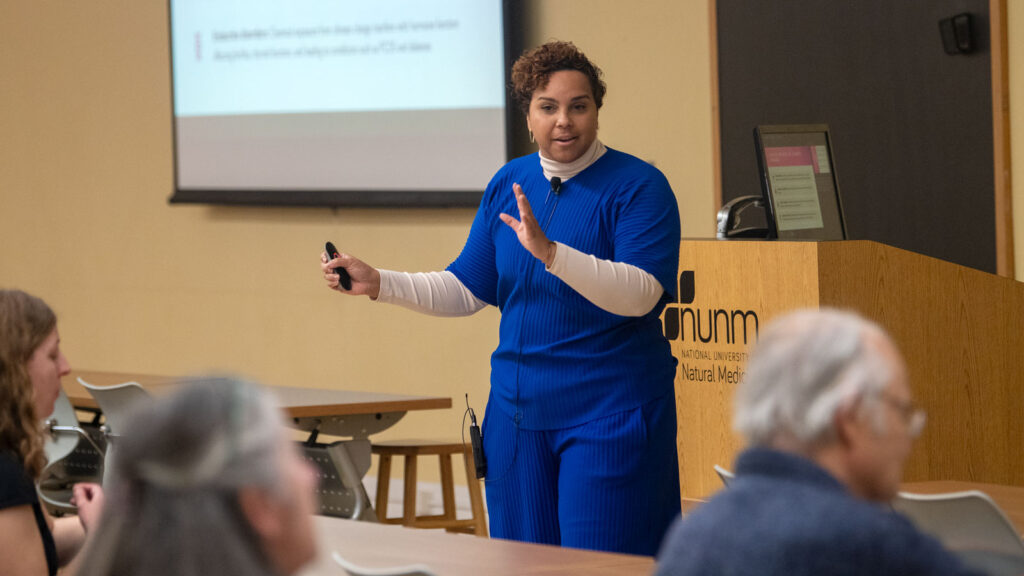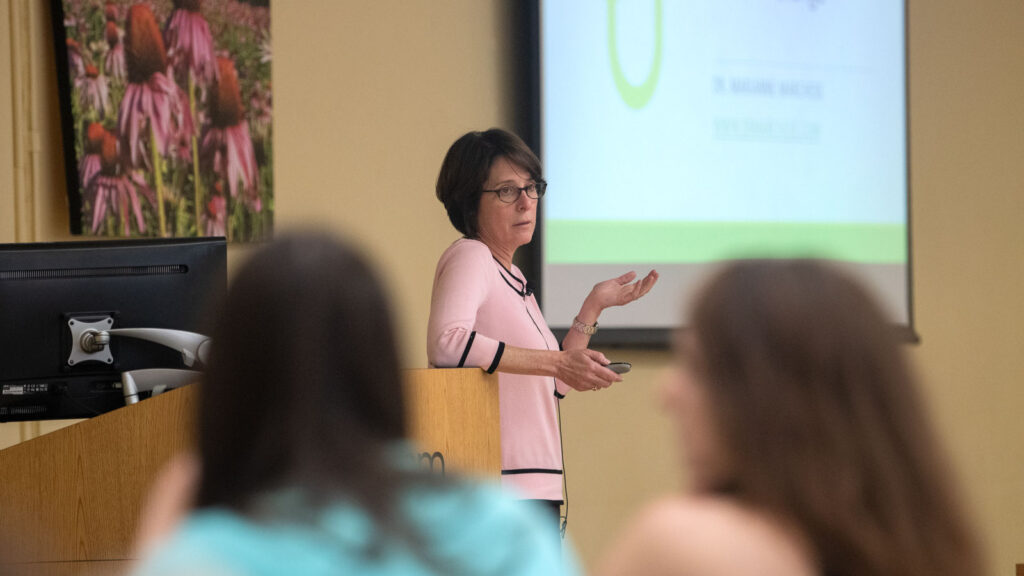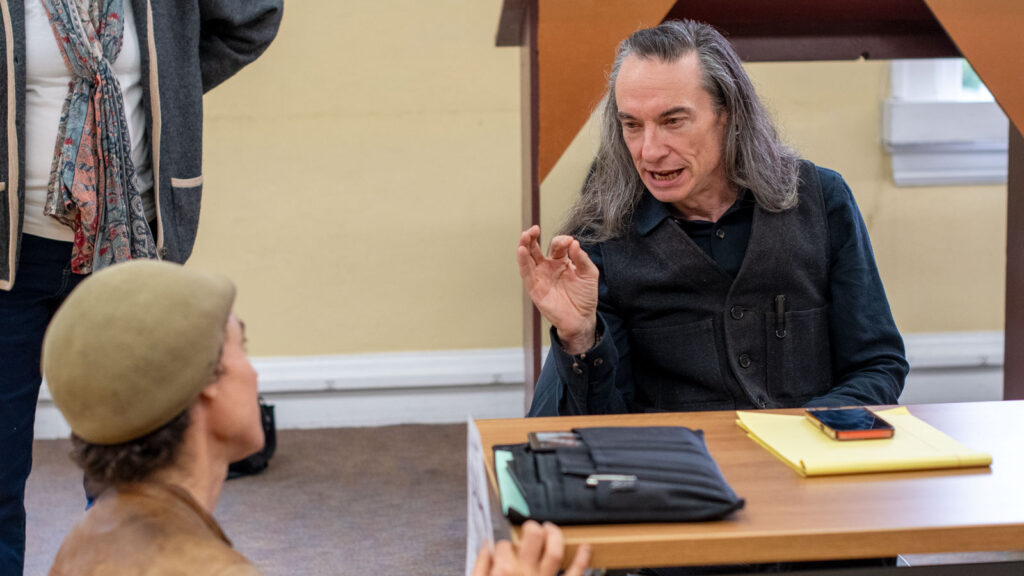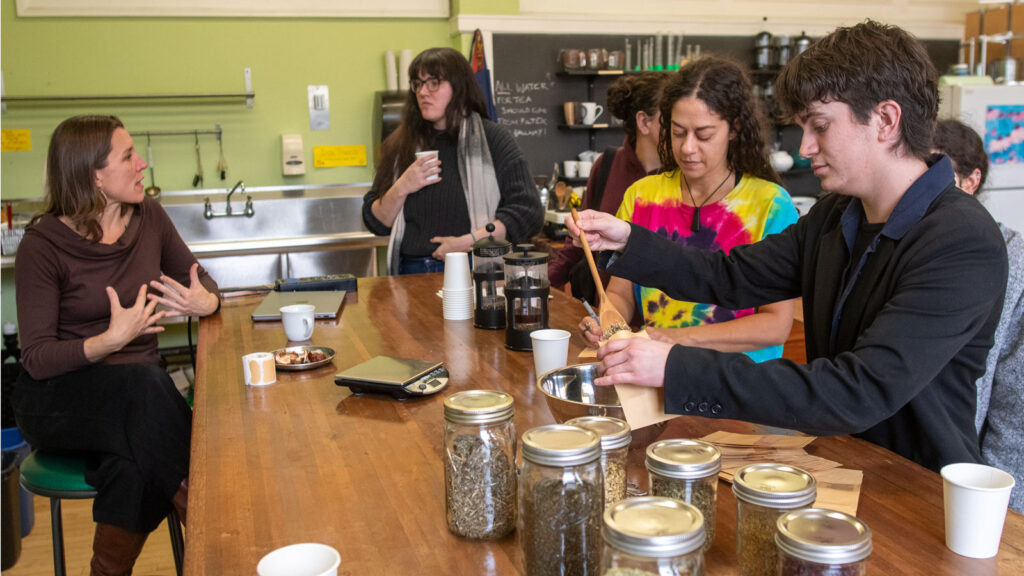Public attendees gathered at university’s Discovery Day to hear medical experts discuss global risks and natural medicine’s proactive solutions.

The National University of Natural Medicine (NUNM) community gathered on October 26 for NUNM Discovery Day: Climate Change Health Risks Revealed, which featured discussions from physicians, faculty and naturopathic medicine students on the far-reaching effects climate change can have on health.
More than 60 students and community members attended NUNM’s Academic Building in Portland, Oregon, to hear TED-style talks from medical students and seasoned climate medicine experts, as well as view clinical demonstrations and tour the campus.
Accomplished faculty speakers included Brandt Stickley, associate professor of classical Chinese medicine, Dr. Kimberly Queen, a board licensed dietitian and associate professor of nutrition, and Dr. Marianne Marchese, associate professor and attending physician at NUNM.
They were accompanied by Dr. Nozomi Gonzalez, a third-year chief medical resident, and fourth-year Doctor of Naturopathic Medicine students Maggi Weiseman and Eden Jeffries.
NUNM professor Dr. Marianne Marchese, a seasoned environmental medicine leader and organizer of the event, opened the discussion with an overview of the increasingly global and nationwide health impacts brought on by climate change.
“It’s important that physicians are learning the signs and symptoms, even if they live and practice in a region where they never had these diseases before.”
— Dr. Mariane Marchese
She said that major and often long-lasting health effects are seen to result from more frequent environmental incidents such as hurricanes and severe drought, which can now have complex consequences on individual and community health.
“Climate medicine is what every physician is going to need to know how to practice because climate change isn’t going away,” said Marchese. “We see it clinically—our patients are coming in sicker and have more than one health complaint—they have multiple complaints and some of them are chronic.”
Physicians have been finding it more difficult to treat patients and diagnose illnesses when multiple complaints occur, she said, and those in healthcare have often seen this result from the cumulative effects of climate change.
Conditions such as Valley Fever, which used to be endemic to certain regions of the country are now being seen as far north as the state of Washington, she said.

“It’s important that physicians are learning the signs and symptoms, even if they live and practice in a region where they never had these diseases before,” Marchese said.
Environmental changes in temperature can not only lead to direct events such as wildfires, but also have more subtle consequences for patient health, she said.
Brianna Worthing, a fourth-year student in the Doctor of Naturopathic Medicine program at NUNM who also contributed research for the event presentations, said that less obvious impacts such as soil nutrient depletion may also be detrimental to health.
“This depletion reduces the nutritional quality of our food and combined with increased toxin exposure through runoff and residual pesticides, our food continues to become more toxic and less nutritious,” she said.
Additionally, hotter soil has meant more pesticides are contained for longer periods of time, according to Marchese.

“Did you know that pesticides sprayed in other countries can end up in the Southern half of the US a few days later just due to wind,” Marchese said, noting that changing wind patterns have directly contributed to chemicals now traveling further across the globe.
“Our job and what we learn to do here at NUNM,” she said, “as students in the classroom and as student clinicians over at the clinic, is how to ask the right questions of our patients.
“When they can’t seem to get a diagnosis and they’ve been everywhere but aren’t getting better, we can start asking these questions and doing some testing and some treatments to figure out ‘a-ha, this is what’s happening.”
Eden Jeffries, a fourth-year Doctor of Naturopathic Medicine student, stressed the importance of environmental medicine as part of the curriculum at NUNM.
“Because of our unique education, we get to think a little more unconventionally about the complaints that our patients are coming in with—about the chronic diseases that are becoming more and more prevalent,” she said. “We get to use some of our clinical tools, our clinical brain and our humanity just being in and of the world to think a little bit out-of-the-box.”
Jeffries added that lab testing can be used to rule out environmental factors when there are ambiguous or recurring issues such as allergies or gut health problems so that patients can get closer to answers. Chemicals from everyday products and mycotoxins within our food system can lead to immune system dysregulation, and these symptoms can be tested for in clinic often through simple blood or urine samples.
“We might not even be aware of the ways that we’re exposed through our homes, our work environment and through pollutants in the air,” Jeffries said, adding that individuals may be experiencing a variety of symptoms without knowing when they occur until they feel heightened.
Jeffries stressed that this is where naturopathic physicians can come in to help better identify links to the environment.
“My hope is that whether you’re a prospective student or a prospective patient,” she said, “you will feel a little more informed and empowered to think about what some of the root causes of either your personal issues or other medical concerns or medical complaints might be and speak to your provider.”

To reiterate the unique role naturopathic medicine can play in screening, testing, and treating environmental toxins burdens, Worthing said there are additional health interventions available through integrative medicine such as IV therapy, hydrotherapy, and acupuncture.
“We want to empower individuals by equipping them with the knowledge to reduce their exposure, make health-aligned choices, and access resources to support prevention and avoidance,” Worthing said.
To close the event, which was sponsored by Priority One, Marchese underlined natural medicine’s ability to help healthcare providers intervene early before symptoms worsen. She also shared proactive steps physicians can take with the aid of herbs or nutrients to improve health so individuals can better withstand some of the effects of climate change.
“But we have to act now, because there’s still people saying climate change doesn’t exist,” Marchese said. “This is my message to people: vote for the environment, because we do have to have some regulation to stop some of these greenhouse gases, and then be an advocate not just for yourself but for other people.”
by Ashley Villarreal, Marketing Content Specialist
Disclaimer: The information provided in this article is for educational and informational purposes only and is not intended as medical advice. This content should not be used as a substitute for professional medical diagnosis, treatment, or consultation. Always seek the guidance of a qualified healthcare provider with any questions you may have regarding your health or medical condition.